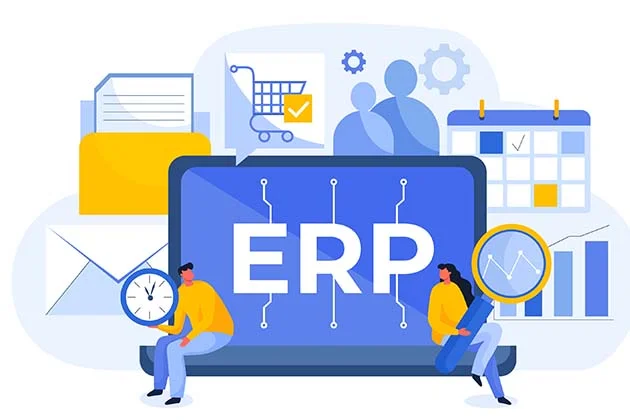ERP or Enterprise Resource Planning software was already used in different industrial markets. It is loaded with more advanced features that help automate various department business functions.
These days, the healthcare industry already uses the system in its transactions. The system can handle different business functions, including customer relationship management, inventory management, financial accounting, and human resource management.
Various hospital departments require integrated systems for their support service, core services, and back-office operations. So, Healthcare ERP software can be a good investment in the healthcare industry. Implementing Healthcare ERP software can lower overheads and operating costs.
It cannot be denied that meeting substantial cost reduction and quality patient care can be challenging for healthcare providers. Implementing an ERP platform for the healthcare industry can increase efficiency for healthcare providers while lowering clinical errors.
With the help of the latest innovations, hospitals and other healthcare companies integrate patient databases with vital doctor and employee details. Clinicians and doctors may require information on diagnostic reports from patients to facilitate communication and make effective therapies and treatments.
Streamlining information is essential through laboratory systems, pharmacy, image archiving, radiology, electronic medical records, and communication system. On the other hand, patients can also access the gathered information from their medical records to arrange appointments and make decisions.
The following are some reasons to implement ERP in the healthcare industry. The reasons for implementing ERP software in the healthcare industry are administrative and clinical – operational performance, cost control, better clinical results, and patient health improvement.
Why should you implement ERP for the healthcare industry?
Implementing Healthcare ERP software can provide many benefits:
- Improved patient care
ERP software can provide healthcare specialists with remote access to critical reports and resources for their patients. In addition, it can also aid patients in making timely care and informed decisions.
The automated, advanced system also quickly helps schedule medical procedures and future tests. The ERP system makes sure that the vital information of the patient can be accessed on multiple systems. Combine this with occupational health consulting services to create a seamless approach to managing employee health and wellness. These services integrate with ERP systems to provide comprehensive care solutions, ensuring better health outcomes and improved organizational efficiency.
- Initiation of best practices and streamlining of healthcare processes
It can be accomplished by incorporating essential facilities, including electronic medical records management, patient identification, OPD, emergency services, and the radiology department.
Healthcare organizations need to efficiently track all procedures and policies regarding payments, member benefits, networks of providers, and registration, keeping them up to date with excellent practices.
- Lower operating costs
Healthcare ERP software can lead to process efficiencies as part of an IT automation system. It can carry out various tasks like human resources, accounting, and payroll and place them in a shared database. It can automate back-end procedures like inventory handling, account management, and payroll management.
- Safety of the patient
By facilitating communication between patients and physicians, the ERP system can aid healthcare providers in enhancing patient safety. Many organizations consider an integrated ERP system an organizational imperative to give about a culture of the patient’s health.
- Business intelligence and strategic planning
If you operate a hospital, ERP program implementation can give improved business knowledge to let you create better decisions. The ERP system can assess and calculate the operational efficiency of the hospital. It can also provide details on requisitions, budgeting, and patient visitation.
ERP software can guide administrators and owners in devising a business plan. It can target and search areas for improvements, boosting overall performance. Once the areas which need improvement are identified, it can be easy for the top management to monitor and determine whether or not the policies in place are helpful.
- Electronic storage of health-information
Healthcare providers and hospitals should store essential data on their patients and business processes. Implementation of an ERP program for healthcare is a good investment for ensuring confidentiality and protection of all data. Users can easily update all data stored within the system with the ERP software.
Is it essential to integrate ERP software in healthcare?
Yes, integrating ERP software in a healthcare organization is a good investment. Utilizing different healthcare systems for hospital operations management may require challenging and costly maintenance. Luckily, the ERP system facilitates the integration.
From finance to billing, human resources, and inventory to keeping records, the ERP software will keep all hospital operations streamlined. In addition, it will store all data in a centralized database.
It can save you from the hassle of time-consuming data collaborations and multiple systems management. With a unified database, doctors and hospital staff can easily access information. It can enhance the efficiency of staff and patient care.
ERP software can also reduce operational errors. If you choose manual hospital operation management, there’s a high chance of human errors in processing and tracking.
Integration of ERP systems can automate hospital operations. With this, mistakes can be reduced. Manual errors can be prevented, including clinical faults, missing patients’ bills, mismanagement of appointments, cost leakages, and other operational mistakes.
Without human intervention, ERP systems can perform different tasks. So, it can significantly enhance operation accuracy. The system can change how your healthcare organization operates. Without ERP software, healthcare professionals may be disconnected. Furthermore, operations can be more time-consuming.
In other terms, ERP software has a crucial role in the healthcare industry. As mentioned earlier, the ERP system can handle main business functions, including inventory management, accounting and finance, HR management, and CRM.
As you observe, different clinic departments and healthcare organizations need integrated systems for incorporating core services, support services, and back-office operations. It can be beneficial in reducing operating costs.
ERP software can be an effective tool for healthcare organizations to make the best of their operations. With this, they can also improve patient care.
Conclusion
To sum up, integrating ERP software in the healthcare industry can help insurance companies, healthcare specialists, and patients under one umbrella. It can also centralize all the relevant information.
Innovative and user-friendly ERP solutions from diverse providers may aid healthcare specialists in focusing on their core concerns, including quality patient safety and care.
In today’s modern world, healthcare organizations use ERP software to improve their overall performance and attain competitive advantage. Increasing transparency and accountability standards hastened the adoption of the ERP system. Additionally, top healthcare companies exploit ERP software to be compliant.










